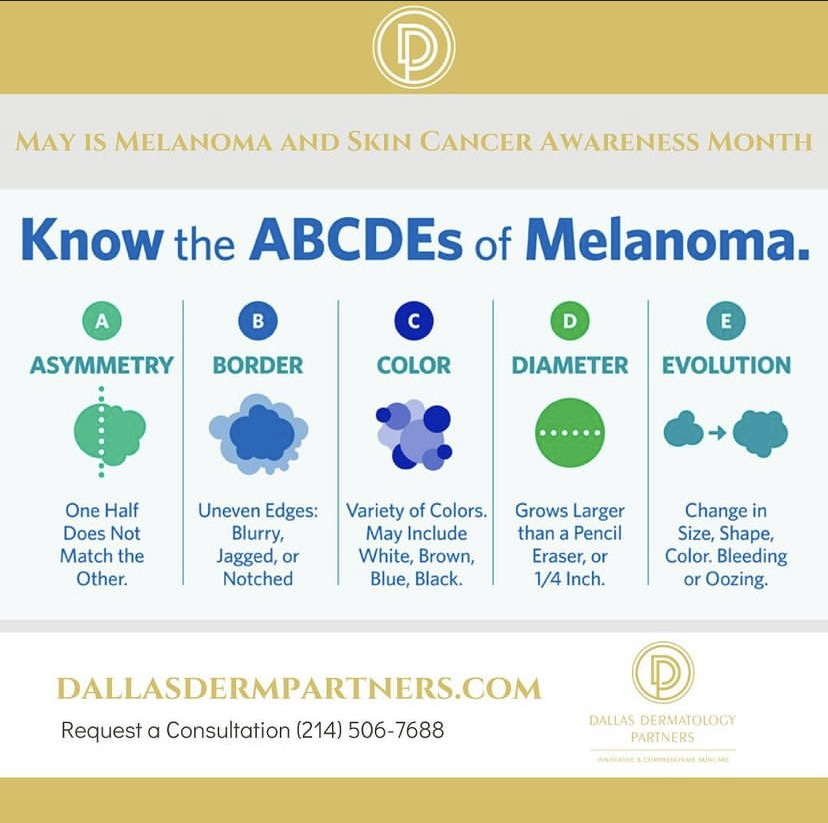Twenty percent of Americans will develop skin cancer at some point during their lifetime. Fortunately, the majority of skin cancer malignancies, which are an uncontrolled proliferation of skin cells, are easy to cure, as long as the lesion is detected early.
Routine full-body screenings by a board-certified dermatologist who is expertly trained in detecting and treating skin cancers are key for identifying potential changes and receiving an accurate and timely diagnosis. If you have skin-related concerns or a worrisome spot, contact Dallas Dermatology Partners for expert diagnosis and supportive treatment.
Causes of Skin Cancer
Skin cancer can develop when normal skin cell growth and replacement cycles are impaired or disrupted by DNA damage. New cells may form when they are not needed, or older cells may not die, both of which can cause tumor growth. DNA damage is often a result of ultraviolet radiation from sunlight or tanning lamps. In some cases, skin cancer affects areas of the skin that have not been exposed to the sun. Certain factors, such as fair skin, moles, a weakened immune system, tobacco use, genetics, and age, also increase skin cancer risk.
Types of Skin Cancer
There are three major types of skin cancer, and they affect different layers of the skin.
Basal Cell Carcinoma
Of all skin cancers, basal cell carcinoma is the most common. It forms in the deepest layer of the epidermis, is very slow-growing, and is most prevalent in people with fair skin. Basal cell carcinoma usually occurs in areas of the skin that have been exposed to the sun, including the face, arms, hands, neck, and scalp. This type of skin cancer rarely spreads to other parts of the body. If left undetected and untreated, basal cell carcinoma can damage blood vessels, nerves, bone, and underlying tissue.
Squamous Cell Carcinoma
Squamous cell carcinoma occurs in the squamous cells, which are located near the surface of the skin. SCC is the most common type of skin cancer in people with darker complexions. It typically occurs in sun-exposed areas such as the face, head, ears, and lips, though it can develop anywhere on the body. Early stages of squamous cell skin cancer often manifest as crusty, scaly, red, or bleeding patches. This skin cancer is highly treatable when caught early. Untreated, SCC can become invasive and spread to other parts of the body.
Melanoma
Melanoma is the most aggressive type of skin cancer and the most likely to spread to other parts of the body. Melanoma occurs in the skin's melanocyte (pigment) cells and can form on any part of the body, regardless of past sun exposure.

What Does Skin Cancer Look Like?
The clinical features of skin cancers can vary from person to person. Regular self-exams in a well-lit room are the easiest way to identify a new spot or troublesome growth on the skin. The warning signs of precancerous and cancerous skin lesions may include:
- A mole that changes shape or color
- Pearly or waxy bump
- Flesh-colored or brown scar-like lesion
- Raised growth or lump
- Firm, red nodule
- Crusted, flat lesion
- Reddish bumps with raised edges
- Large brown spot with darker speckles
- Shiny, firm bumps
Diagnosis of Skin Cancer
Your dermatologist will perform a thorough examination of the skin, looking for unusual growths or abnormal patches. An intense magnifying light known as dermoscopy is often used to detect early skin cancers and rule out benign lesions. If skin cancer is suspected, a small biopsy may be taken. Once the results are reviewed, the type of cancer can be determined, and a treatment plan will be formulated.
Treatment for Skin Cancers
As noted above, when caught early, most skin cancers are highly treatable. Treatment depends on the type, stage, and site of the cancerous cells. Most options include the removal of the entire growth and are effective forms of treatment. Removal procedures are usually simple, requiring only a local anesthetic in an outpatient setting.
Our dermatologists treat early forms of basal cell and squamous cell skin cancer here in our Dallas office. Skin cancer treatments offered include:
- Electrodessication and Curettage (ED & C)-- a local anesthetic is applied, and the cancerous cells are scraped from the skin several times using a curette. A hyfrecator is used to burn off any remaining cancer cells.
- Surgical Excision-- Basal cell or squamous cell carcinomas are locally anesthetized and removed in a simple surgical excision that includes a small border area of healthy skin to ensure the elimination of all cancer cells.
- Cryosurgery-- a non-invasive procedure that uses liquid nitrogen to freeze and destroy superficial precancerous skin lesions (such as actinic keratoses). Cryosurgery requires no anesthesia and is an effective option for low-risk basal cell carcinomas.
- Topical Treatments -- chemotherapy agents such as imiquimod and 5-flurouracil may sometimes be utilized to treat superficial skin cancers.
Skin Cancer Prevention
You can reduce the risk of developing skin cancer by protecting your skin from the damaging effects of UV radiation and following these tips:
- Limit sun exposure, especially between 10 a.m. and 4 p.m.
- Wear sun-protective clothing
- Apply a broad-spectrum sunscreen of SPF 35 or greater, rain or shine
- Avoid tanning beds and salons
- Perform routine self-exams to spot skin changes
- Get a skin cancer screening from a dermatologist
Dallas Skin Cancer Dermatologist
At Dallas Dermatology Partners, we are committed to providing compassionate patient care to residents throughout the Dallas/Fort Worth area, including Addison, Plano, Richardson, and Frisco. Our board-certified dermatologists have extensive experience in detecting, diagnosing, and treating many forms of basal cell and squamous skin cancers. Schedule your dallas dermatology appointment today!
